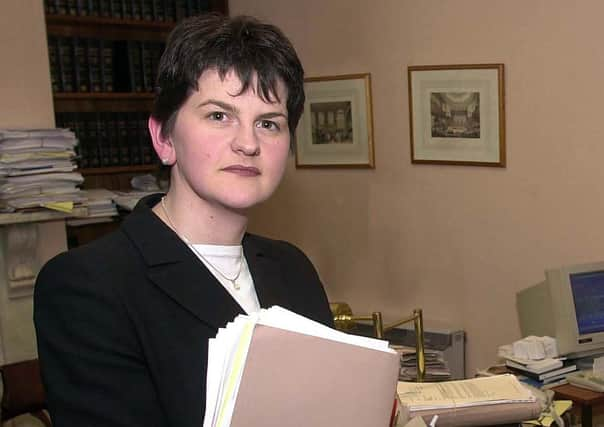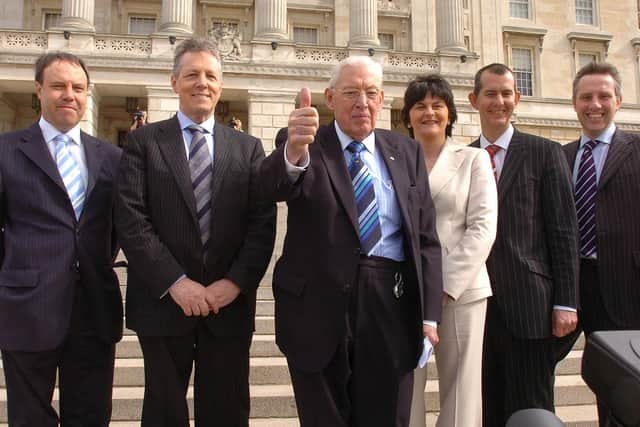Ben Lowry: Arlene Foster is said to want to quit the DUP, yet the party gave her huge opportunity after she helped ruin the UUP


I have observed the outgoing DUP leader in various settings, from speaking well in London or on southern Irish media to talking intelligently and thoughtfully in person.
She would have been at her best if she had presided over a time when unionism was secure, and so have felt more able to act on her outreach impulses (so long as she had expert advisors to help with details of government policy).
Advertisement
Hide AdAdvertisement
Hide AdMrs Foster’s moderate instincts clashed with harder ones, as is the case in many people, but the discord post the June 2016 Brexit vote meant that those two competing impulses were in obvious tension.


This led to the see-sawing that confused many of her allies and hastened her downfall.
Tributes to an outgoing leader will always be influenced by the nature of the departure, and one reported version of Mrs Foster’s intentions looks ugly.
The BBC said yesterday she will quit the DUP because it is not the party she joined.
Advertisement
Hide AdAdvertisement
Hide AdWhen asked yesterday about that claim, Mrs Foster sidestepped it, but I trust that the BBC had good sources.
The most charitable thing that could be said of such a resignation from the DUP is that it would be baffling.
Yes, it is not the party she joined, which was far more fundamentalist in character, with Dr Ian Paisley at the helm. Yet she seems now to think that a much more moderate DUP than then is in fact too hardline.
Mrs Foster left a more moderate, secular and pragmatic party, the Ulster Unionist Party, and helped almost destroy it in the process.
Advertisement
Hide AdAdvertisement
Hide AdShe did not quit the UUP in principle swiftly after the Belfast Agreement, as Jim Allister left the DUP straight after it shared power with Sinn Fein. Rather, Mrs Foster left the UUP almost six years after the 1998 deal.
She did so just weeks after being chosen by the Ulster Unionists as a candidate, and standing for election on that ticket and winning that mandate. It was a ruthless, even treacherous, deed.
People in the DUP point out that she was superbly treated after the defection and given only golden positions. This culminated in Mrs Foster being made leader and sustained in the post for years, despite growing misgivings about her suitability for the role.
Mrs Foster lost support of almost all her MLAs, so it is natural she feels bruised. But time heals and I believe that the best course would be one of gratitude towards a party that gave her such huge opportunity, reflection on why colleagues turned on her, loyalty to her successor whatever her private misgivings, and humility in a new role, perhaps the Lords.
It would be a route to rehabilitation, even popularity.
• Ben Lowry (@BenLowry2) is News Letter deputy editor
Advertisement
Hide AdAdvertisement
Hide AdOther articles by Ben Lowry below, and beneath that information on how to subscribe to the News Letter:
• Ben Lowry April 24: NI seems to rely increasingly on just one pollster for data on attitudes to a border poll
• Ben Lowry April 17: DUP still has to choose between managing this disaster or total rejection of it
Advertisement
Hide AdAdvertisement
Hide Ad• Ben Lowry April 10: His enduring marriage to the Queen was key to our understanding of Prince Philip
• Ben Lowry April 3: Radio grilling of UUP leader exposed folly of unionists blaming Simon Byrne for funeral
• Ben Lowry Mar 27: There should not be an Irish language act, but it is too late — the DUP has agreed one
• Ben Lowry Mar 20: We have made it through the worst of the dark, dreaded winter lockdown
Advertisement
Hide AdAdvertisement
Hide Ad• Ben Lowry Mar 20: MLAs lost control of abortion by rejecting modest law reform
• Ben Lowry Mar 13: Whatever future Boris Johnson adopts for Northern Ireland seems set to lead to a crisis
• Ben Lowry Mar 13: Scotland tunnel isn’t fantasy, but something kids of today might see
• Ben Lowry Mar 6: The cost of victims’ pension has ballooned without explanation as to why
Advertisement
Hide AdAdvertisement
Hide Ad• Ben Lowry Feb 27: Unionists have fully turned against Irish Sea border because they’ve seen the scale of disaster
• Ben Lowry Feb 20: We still lack answers as to why IRA funeral got special treatment at Roselawn
• Ben Lowry Feb 13: Peter Robinson has long experience of what is and is not politically feasible
• Ben Lowry Feb 6: There is barely any unionist support for violence, despite justified anger at sea border
Advertisement
Hide AdAdvertisement
Hide Ad• Ben Lowry Jan 30: At last, clear reason for UK and unionists to stop being weak towards Ireland/EU
• Ben Lowry Jan 23: Lockdown sceptics have been undermined by crazy theories, but sensible criticisms haven’t gone away
• Ben Lowry Jan 16: The Irish Sea border was imposed because UK knew unionists would take it
• Ben Lowry in 2020: Last night unionists celebrated a move towards Irish unity
——— ———
A message from the Editor:
Advertisement
Hide AdAdvertisement
Hide AdThank you for reading this story on our website. While I have your attention, I also have an important request to make of you.
With the coronavirus lockdown having a major impact on many of our advertisers — and consequently the revenue we receive — we are more reliant than ever on you taking out a digital subscription.
Subscribe to newsletter.co.uk and enjoy unlimited access to the best Northern Ireland and UK news and information online and on our app. With a digital subscription, you can read more than 5 articles, see fewer ads, enjoy faster load times, and get access to exclusive newsletters and content. Visit https://www.newsletter.co.uk/subscriptions now to sign up.
Our journalism costs money and we rely on advertising, print and digital revenues to help to support them. By supporting us, we are able to support you in providing trusted, fact-checked content for this website.
Alistair Bushe
Editor